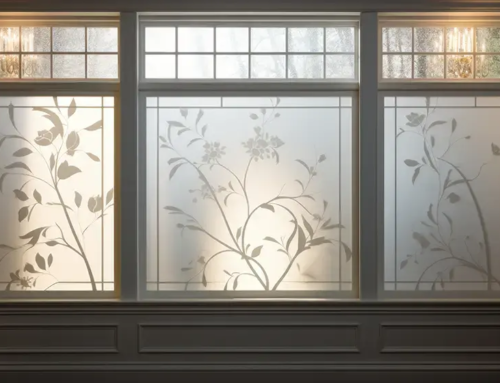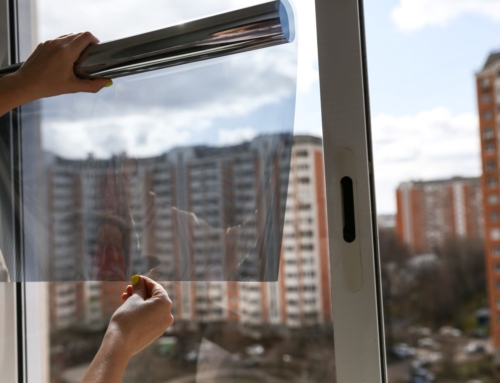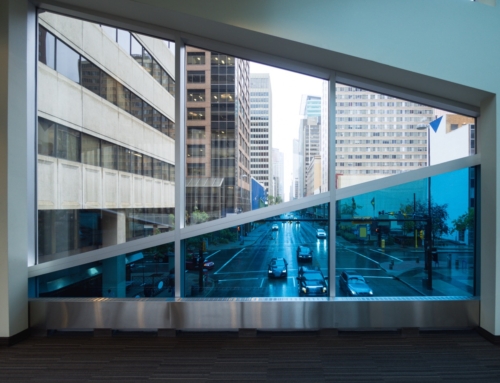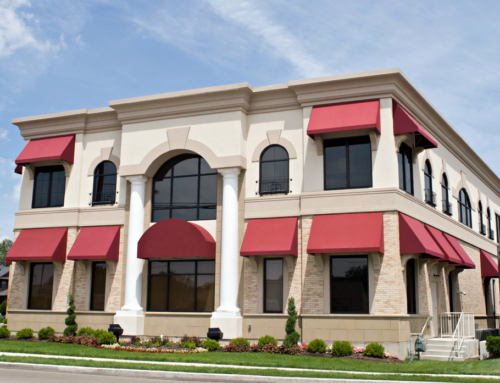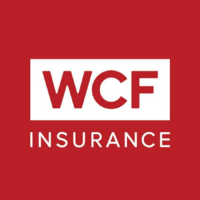Window films have made great strides in quality and usefulness in recent years. As these products have become better and better, they have become more and more popular. On commercial properties, the appropriate solar control glass film can reduce energy costs, maintain a more comfortable and productive environment, reduce fading of interior surfaces, lower harmful UV rays, and even increase the natural light deep into the building. Here are just some of the benefits:
Energy Efficiency
Just like insulation in your walls and ceiling, solar control window films help better insulate your windows to reduce the solar gain by as much as 75%. This reduces air condition run time and lowers the load on the condenser. In the winter, it helps to keep heat in.
How much money can tinted windows save a business in energy costs? This depends on several factors, such as the size and type of building, the climate, and how much sunlight the building gets. However, businesses can generally expect to see a reduction in their energy bills of between 15 and 30%. In some cases, the savings have been even greater.
Fading
The sun’s ultraviolet (UV) rays are the leading cause of fading of furniture, flooring, and window treatments. By blocking up to 99% of the UV rays, window film can help preserve and protect your valuable investments from fading. This happens because the film reflects the UV rays away from the window, instead of allowing them to pass through the glass and into the building.
Natural Light
One of the benefits of solar control window film is that it can help increase the amount of natural light in a space. This is because some of the films are designed to reflect heat away from the window, but still allow visible light to pass through. This means that the film is not as dark as a traditional window tint, and it can brighten up a space.
Fast Return on Investment
With typical window shapes and sizes, the return on investment for most window films is approximately three years. However, in comparison to the cost of a new window replacement, installing a window film over an older window is 10% – 15% of the cost of a new window replacement. Significant savings can be received quickly when applying films instead of replacements. Films are also a fraction of the cost of buying tinted glass in new windows.
UV Protection
Solar control window films block out up to 99.9% of all harmful UV rays, which can lead to skin disease and photosensitivity. The sun’s ultraviolet rays are also the leading cause of fading in interior finishes such as furniture, carpet, and other flooring, wall coverings, artwork, draperies, paint, and photographs.
Comfort and Productivity
Employee comfort is important for productivity. A large percentage of workers have trouble concentrating if the office temperature is higher than normal and report that tasks take substantially longer to complete in warmer conditions. By blocking much of the solar heat from entering through windows, films can help to reduce or eliminate the hot and cold spots in your building. The end result is more satisfied tenants and a more comfortable building. Window blinds can also be left open to allow in more of the natural light. Without films, building occupants often close the blinds to reduce the heat and glare, causing an increased need for the use of artificial lighting.
Safety
Glass windows with a film are safer because, in the case of a broken window, the film helps hold the glass together, instead of it flying through the building. In earthquakes, hurricanes, or even vandalism, the glass will stay together in one piece. The right films can also significantly reduce the chance of a smash and grab by thieves because it takes longer to break through the glass.
Redirecting Films
These films utilize micro-replication to take the light that would normally hit the floor and redirect it up to the ceiling. This provides much more natural light in a room and has been linked to increased productivity and behavior; it also decreases the need for artificial lighting.


